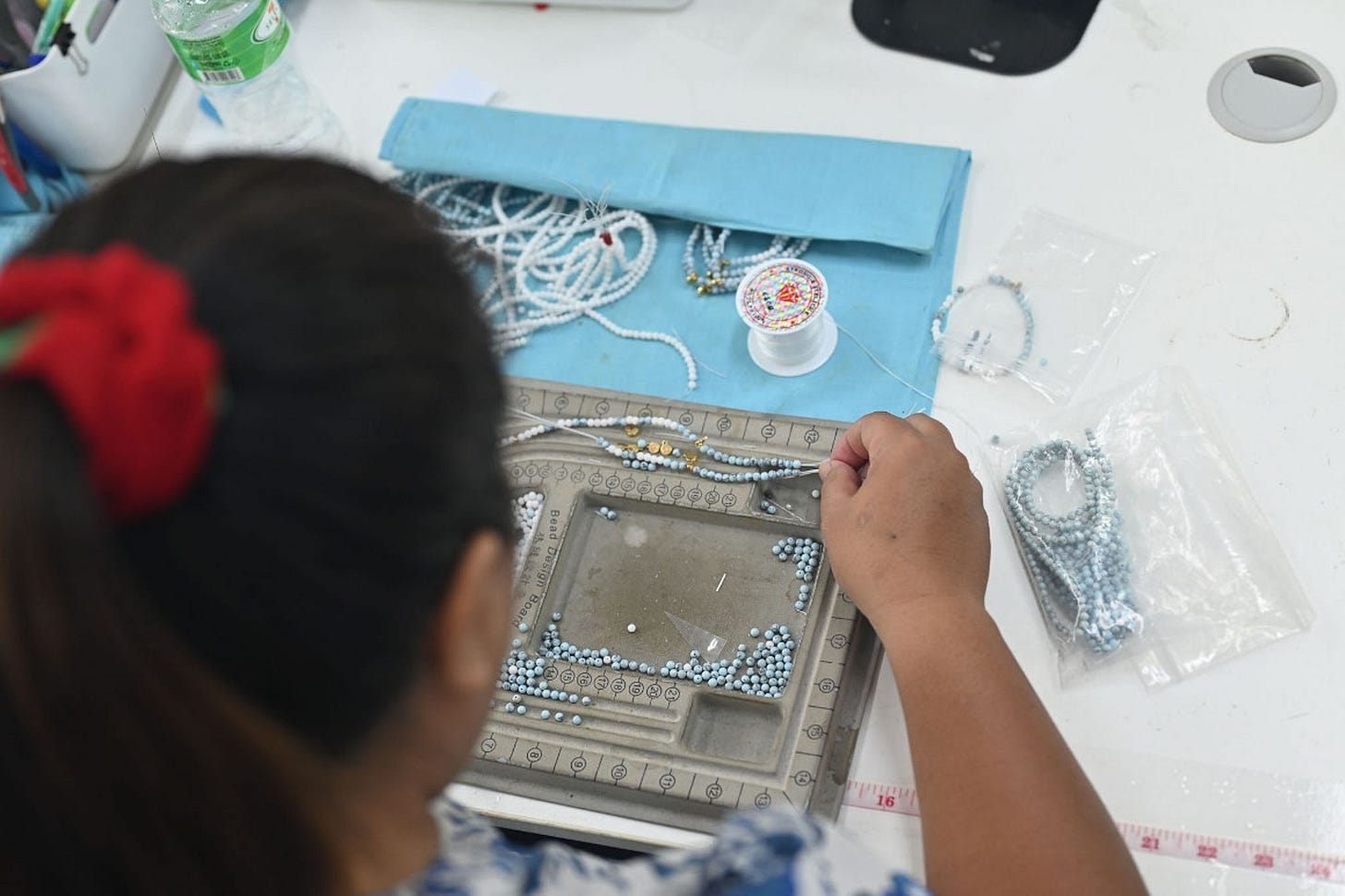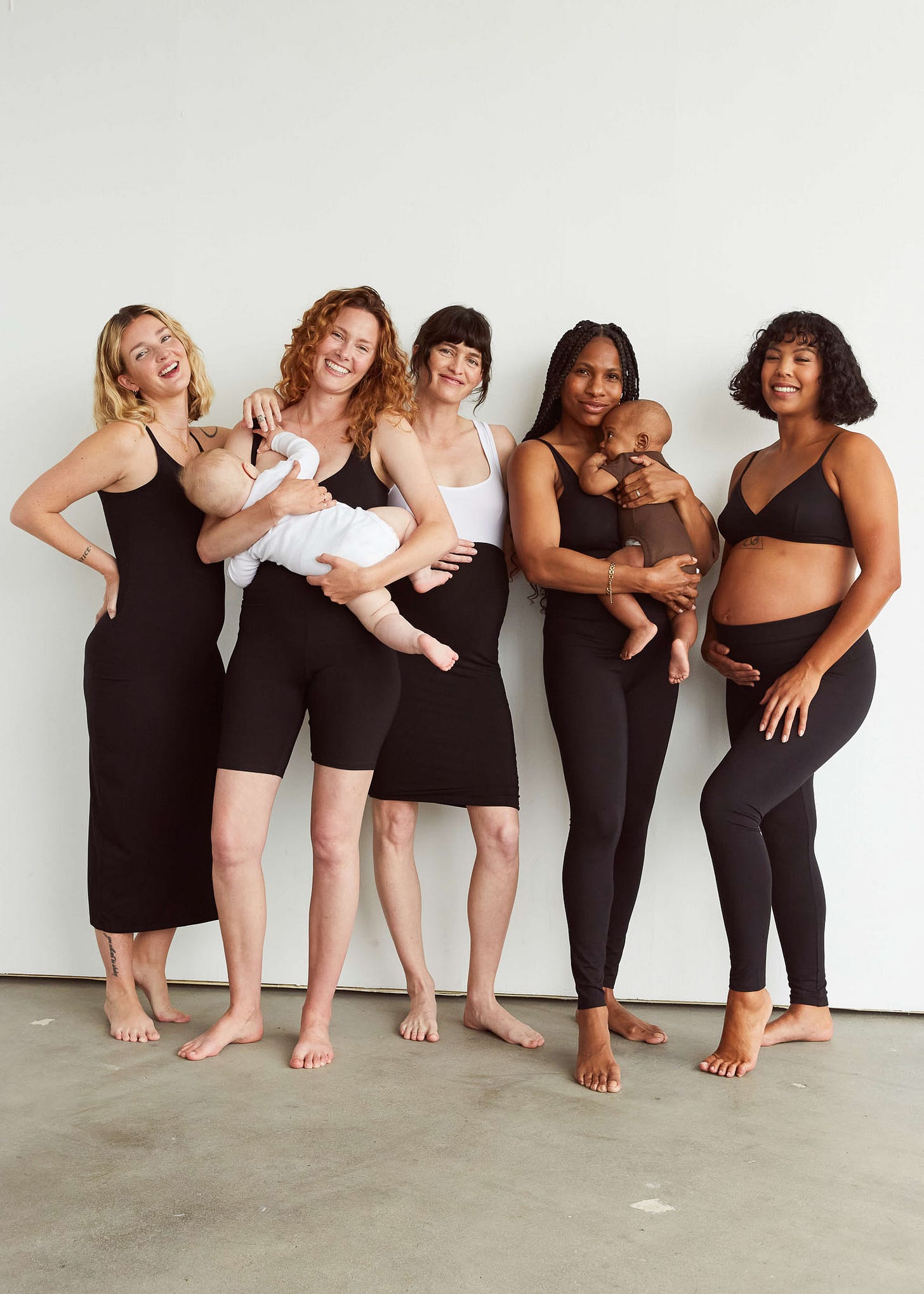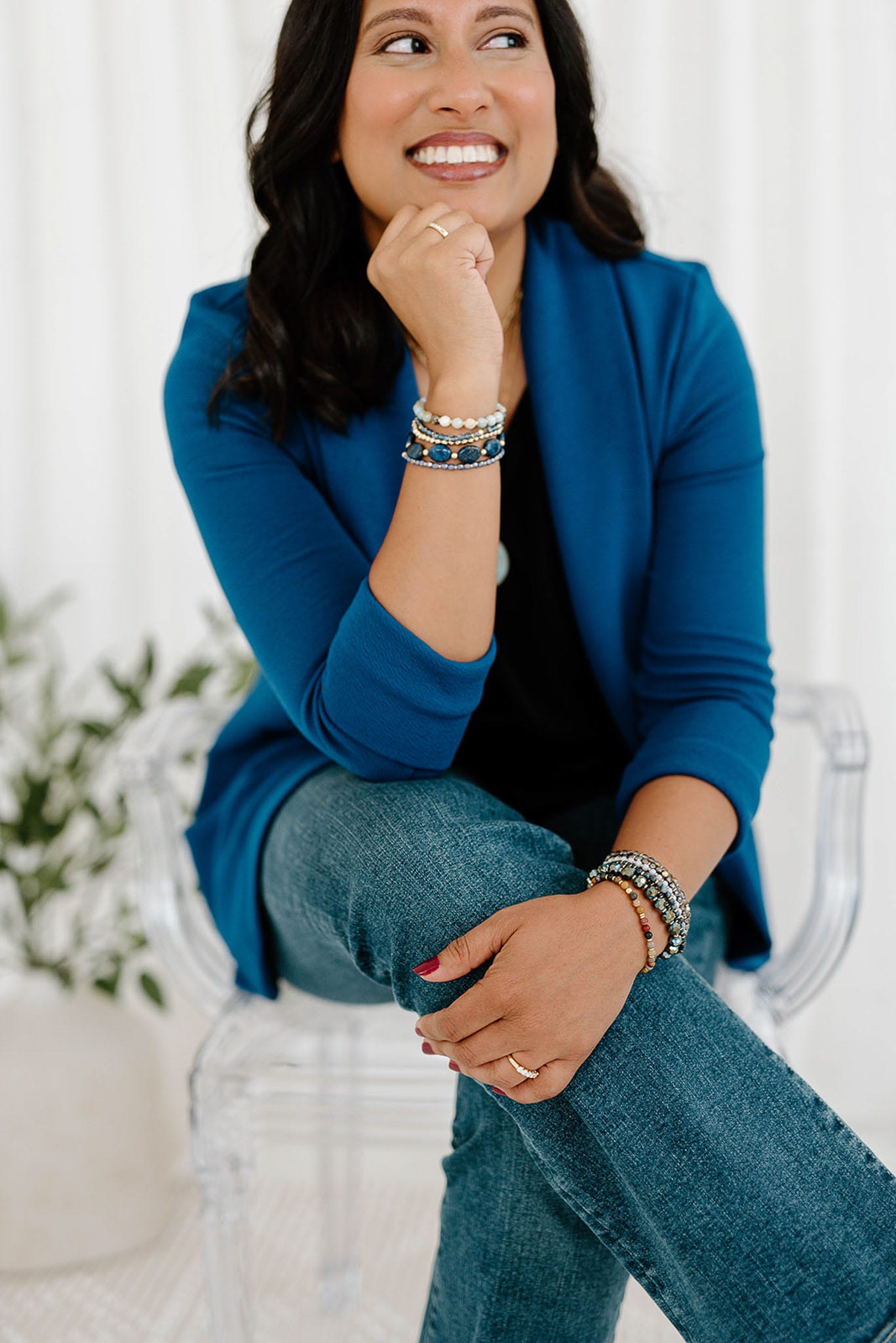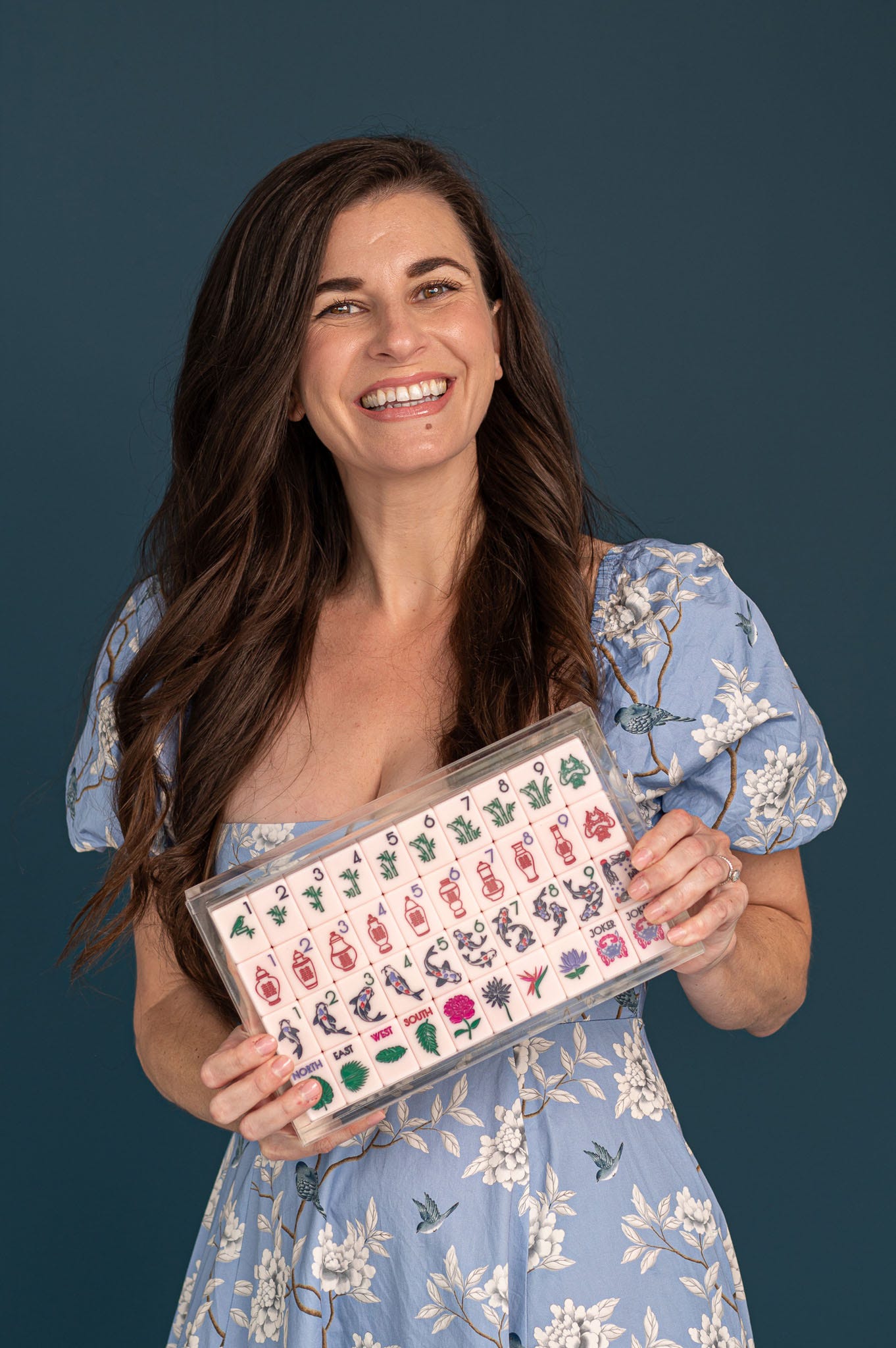Shop Small! 175+ Women-Owned Businesses to Support
Plus, more entrepreneurs share stories illustrating the fallout from Trump’s tariffs.
President Donald Trump singlehandedly caused unprecedented economic volatility this week, implementing then pausing a slate of staggering tariffs while escalating a trade war with China. Consumer sentiment “nosedived” in April, according to the Wall Street Journal, falling to “one of the weakest readings in the past decade.” Shoppers are very concerned — and for good reason. So what can we do?
For starters, we can double down on conscious consumption. So Many Thoughts is, at its heart, about intentionality. Now is the time to vote with your wallet. To that end, I asked on Instagram for folks to share their favorite small, women-owned businesses. I’ve collected the suggestions — more than 175 of them — in this spreadsheet. So many great ideas here for yourself or any of your spring gift-giving needs. You are welcome to share this resource on your channels, too! (Want to add a business to this list? Fill out the form here.)
We can also educate ourselves on the fallout by listening to — and amplifying the stories of — the people most impacted by these policies. Understanding the impact here is key. I was so heartened by the response to my earlier newsletter with Emily Ley, detailing the Simplified founder’s struggles to navigate the tariffs. Below, more stories that dive into the complexities here — including from one of Meghan’s go-to jewelry brands, Ariel Gordon Jewelry. The insights here are sobering:
“This is worse than COVID.”
“Even when you already manufacture in the US, sourcing is inevitably a global collaboration.”
“You can’t mine the stones where the Earth doesn’t grow them. So where does that leave me?”
“Manufacturing in the LA garment district or NY garment district is dismal and unregulated.”
“These tariffs have the power to sink a company like mine.”
My sincere thanks to everyone who shared, both for the shopping spreadsheet and the small business testimonials. I am so grateful for the SMT community.
ICYMI: My candid conversation with Emily Ley is a must-read, as is her latest Substack post.
Small Businesses Share the Fallout from Trump’s Tariffs
Note: Some of these responses have been lightly edited and condensed.
Ariel Gordon Jewelry
Insights from Ariel Gordon Maffei, founder
About Ariel Gordon Jewelry: [EH Note: This is a brand Meghan wears regularly!] Fine jewelry made with love in downtown LA jewelry district. AGJ is a company that is independently funded, female-owned and operated, and founded on the mission of creating heirloom jewelry that can be worn every day.
Impact of Trump’s tariffs: I’m a mom / founder-led jewelry designer based in California. I’ve been running Ariel Gordon Jewelry for over 16 years now. While I’m no longer an emerging designer, I’m still very much a small business.
The businesses that can afford to survive this kind of economic and supply chain uncertainty aren’t small businesses like mine. They are the big dogs — car manufacturers, Big Tech, venture-backed companies. The American Dream that this administration loves to stump for is being crippled right now. All of the organic growth that I’ve worked so hard for over the last 16 years is being knocked down. I would love the opportunity to source every jewelry component in America but that isn’t the nature of my industry. While I do make my jewelry in America — meaning the casting, the assembly, the stone setting, the engraving, the enameling, the hand fabrication — the materials I use are not available natively in the US. The supply chain that sources the jewelry industry is a global one and has been formed over decades — meaning the mining, the stone cutting, the chain factories, the packaging, etc.
The US doesn’t have the infrastructure to make everything here. You can’t mine the stones where the Earth doesn’t grow them. So where does that leave me? What am I supposed to do? The price of gold is wildly high right now (when people don’t trust the stock market they speculate in commodities... gold crossed over $3000/oz right after Trump took office). All jewelers are trying to recalibrate their pricing for the cost of gold and now the cost of all their stones, packaging, and other raw materials will all now be impacted.
How can we help your business? Conscious consumerism. Shop small with the brands you’d be sad if they went away.
Shop Ariel Gordon Jewelry here and follow on Instagram here.
ETHICGOODS
Insights from Jenilee Hurley, chief sales officer and one of the brand’s four owners
About ETHICGOODS: We employ survivors of trafficking and sell ethically made, meaningful jewelry, including morse code bracelets, waterproof gold chains and kid’s earrings.
Impact of Trump’s tariffs: Thailand’s average tariff on US goods is just over 8%. But starting April 9, the US is charging a 46% tariff on every handmade piece of jewelry we import from Thailand. What used to cost our business $10 now costs $14.60. [EH note: This tariff is among those that have since been paused.] We employ survivors of human trafficking, so moving things to the US or somewhere cheaper goes against our core values of creating stable, dignified employment to enable sustainable change. We are not cutting costs by cutting people. We will not abandon our mission or our incredible artisan partners to avoid a tax. ETHICGOODS is here to stay, choosing people over profit.
How can we help? We are currently running a sale on our inventory knowing that we will need an influx of cash to be able to bring in our next season of orders, because we pay everything upfront to ensure the artisans get paid. We have a sale going through April 15th, and just spreading the word about our sweet little business!
Scot Meacham Wood Home
Insights from Scot Meacham Wood, owner and designer
About Scot Meacham Wood Home: We design and import textiles for the interior design trade and design enthusiasts.
Impact of Trump’s tariffs: We’re literally trying to get our arms wrapped around this in real time. We print our textiles here in the US, but we import our ground goods from both the UK and the EU. For our woven textiles, a huge part of the DNA of our business is that we focus on goods woven in Scotland. SMWHome Tartans — woven in Ohio doesn’t have the same cache. Our wallpapers are printed here in the US — but some of our substrates and inks are imported. There’s literally a daily email chain as we try to prognosticate upcoming pricing. I’ve been holding our retail price steady for the last several years but, this is likely going to push us to raise prices.
How can we help? As always, any social media exposure works to help expand the footprint of the brand.
Koo de Ker
Insights from Kyong Millar, owner
About Koo de Ker: We are a women’s clothing boutique. We carry several female-owned brands and created our own label.
Impact of Trump’s tariffs: This is my 25th year in business and I have never seen anything like this. I just returned from market and all of my vendors are in a holding pattern. They should be producing Fall / Winter collections but haven’t begun because they have no idea what the tariffs will ultimately be. While in my meetings we talked about pricing models and, to be honest, a 35% to 50% tariff increase would simply put me out of business. This is worse than COVID.
How can we help ? We all need to let our voice be heard. Contact your local government and let them know you’re against tariffs and worried about the impact it will have on small local businesses. Of course, shop local if you can. The larger chains are able to absorb the increases, there’s no way a small business can.
Shop Koo de Ker here and follow on Instagram here.
Storq
Insights from Grace Kapin and Courtney Klein, co-founders
About Storq: We sell maternity and postpartum basics (apparel and intimates) and accessories for parents (diaper bags, play mats).
Impact of Trump’s tariffs: We are completely paralyzed. We manufacture in China (mostly), the Philippines, India and Peru. We don’t know whether a shipment arriving next week will cost what we originally negotiated or up to — as of now — 125% more. We don’t have the financial runway to move supply chains, which takes time, but we also wouldn’t do that anyway given all the upheaval. Small brands don’t have their pick of factories and suppliers, and it can be hard to find someone who will take your type, volume and frequency of business. You spend years building those relationships and lots of time and money on development and production to get everything just right. We had a lot of negative experiences as a young brand manufacturing in the US and that’s part of the reason we moved production overseas to begin with — garment manufacturing in the LA garment district or NY garment district is dismal and unregulated. It’s not some paragon of domestic production virtue. All in all, people will not buy our products at higher prices. And given that we are a niche category, we are one of the first things to get cut from someone's budget when finances become tight.
How can we help? By sharing our experience :)
Isleñas
Insights from Karla López Rivera, founder
About Isleñas: We are a footwear and accessories brand based in Puerto Rico.
Impact of Trump’s tariffs: We manufacture half of our product offering in-house in Puerto Rico because reviving local manufacturing is at the heart of our mission as a brand. To be able to do this, we already take a hit in what would be a standard healthy margin because manufacturing from Puerto Rico is already extremely expensive and not the easy route. With the tariffs (20-25% increase in our leather, soles, and trims imported from Italy, Spain, Japan etc.) our already slim margin is basically non-existent. Raising our prices is not an option. It would greatly reduce our local clients. Even when you already manufacture in the US, sourcing is inevitably a global collaboration.
How can we help? Keep highlighting small brands!
Snuggles and Peanut
Insights from Neha, founder
About Snuggles and Peanut: Our family makes bracelets and other small accessories, and we donate 50% of our profits to various charities. We have donated more than $85,000 to date. [EH note: I wear these bracelets all the time! Neha is a lovely human who makes such thoughtful pieces.]
Impact of Trump’s tariffs: Our beads usually come from Japan or the Czech Republic and, though we use suppliers based in the US, the price of the beads will increase significantly as the tariffs will just be passed on to us. We’ve already received emails about price increases, most of which are staggering. We used our profits from first quarter to order as many beads as we could before the tariffs, but we know when they run out, we either need to raise prices or donate less. Gemstones are almost all imported. The manufacturing of these cannot be moved to the US — generations of knowledge in bead making is required for this level of quality. It’s an art form, not a factory.
How can we help? Buy from small businesses! I’m nervous about having a studio full of beads that we can’t move because of the tough financial situation everyone is in. We spent a lot of money stocking up so we wouldn’t have to raise prices, but now I’m nervous if even our current prices will be too much when people decide to cut back on non-essentials, like bracelets. We also pride ourselves on our donations, and it’s heartbreaking that we may not be able to support certain charities at a time they likely need it the most due to lower sales or increased cost. We’re debating re-working our entire business strategy. It’s a terrifying time to be a small business.
Stems
Insights from Nandita, co-founder and co-CEO
About Stems: Luxury legwear that meets the moment, socks and tights inspired by women and their journeys.
Impact of Trump’s tariffs: Fall is our biggest season, but with tariffs continuing to rise, many of our amazing retail partners are unsure if they’ll be able to accept the orders they’ve already placed for fall deliveries. These stores commit to orders based on their projected cash flow. If their spring and summer sales fall short, they simply won’t have the funds to receive their fall inventory. For us, that means we have to cover the cost of production, increased tariffs, shipping, and storage — on products that might never ship [to be sold at retail]. And if they don’t, we’re stuck holding that inventory for a full year before we even get a chance to sell it again.
How can we help? Would love support navigating increased costs — whether that’s through more flexible funding options, sourcing alternatives, or customer support to help absorb the impact. Tariffs have driven up prices on materials, manufacturing, and shipping, and small businesses don’t have the scale to buffer those hits like big companies do. Every sale, referral, or partnership makes a real difference right now.
Southern Sparrow
Insights from Jessica, founder
About Southern Sparrow: We make mahjong tiles with hand-painted custom artwork, along with mahjong accessories and gifts.
Impact of Trump’s tariffs: The reason I started Southern Sparrow was because designer mahjong tiles were so very expensive—the average high-end set of tiles costs $450, and by the time you buy the accessories (mat, racks, lucite box) the average spend is $1,000. That felt very out of reach for so many women, like me, who want to have pretty/high-quality things but can’t easily spend $1,000 on a hobby. I wanted to provide a gorgeous, high-end option for people to outfit an entire mahjong table with heirloom-quality tiles, a mat, racks, and a lucite box for under $450 (less than other companies are charging for tiles alone). Because I am committed to providing beautiful designer-quality mahjong products for a reasonable price, I am taking a much lower margin than other companies. Mahjong tiles have been manufactured in China since the game was introduced, in the mid-1800s, so there is an expertise (especially for very high-quality and hand-crafted tiles like ours) in Chinese manufacturing that simply does not exist here in the US. These tariffs have the power to sink a company like mine, trying to provide something beautiful for a more approachable price. It really feels so disheartening to be working day and night to build something over the course of the past year (and a year in development before we launched) only to have something so out of my control threaten all of my hard work.
How can we help? Any support for female-owned small businesses is always so helpful, regardless of the political climate. But in this time of uncertainty, getting the Southern Sparrow name out to more people who want beautiful products that don't feel so out of reach price-wise is the best! Because we don't have the deep pockets and resources to skirt around these tariffs, everything feels uncertain. However, I am still fully committed to keeping our mahjong tiles as affordable as I possibly can.
Thank you to everyone who shared their stories. Here’s a spreadsheet with 175+ small, women-owned businesses to support — and don’t forget to contact your elected officials.
Quick programming note: My kiddos are on Spring Break next week so I will not be sending out a newsletter. I will be back in your inboxes after Easter!

















I love this kind of content from you, Elizabeth. You are always so thoughtful and tuned into the zeitgeist.
Here for spreadsheet resistance all day. 👏✊👏✊👏